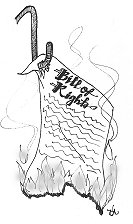Jay Dobyns is no stranger to dangerous adversaries.
Within days of becoming a sworn agent with the Bureau of Alcohol, Tobacco, Firearms and Explosives, Dobyns was taken hostage and shot during a Tucson sting operation.
A year later, he was run over by gangsters in a getaway car.
Since then, he has gone undercover to bust bombmakers, murderers, drug dealers, gunrunners and prison thugs. Three years ago, he infiltrated the Hells Angels so completely that he was offered membership in the biker club.
Now, after nearly two decades of service, after being praised by ATF as a hero and earning national awards, the man known as “Jaybird” is battling his most formidable foe yet: his employer.
Dobyns, 45, is one of dozens of current and former agents to allege mismanagement and misconduct in the ATF, a federal agency responsible for enforcing America’s gun laws and preventing terrorist bombings. More than a dozen lawsuits, administrative claims, grievances, ATF documents and letters to Congress reviewed by The Arizona Republic accused administrators of betraying their own field investigators and operatives out of arrogance or incompetence.
A 2006 inspector general’s report also found that the agency was plagued by poor management and questionable judgment. The ATF director resigned amid the inspector general’s investigation. But agents, lawyers and experts say problems persist, and if left unchecked, a troubled agency will continue to spin out of control.
“The public needs to know,” said Kay Kubicki, a Detroit attorney and former agent who has represented about 25 ATF employees in cases against the bureau, winning half of them and obtaining settlements in some others. “This has a lot to do with homeland security.”
[snip]
In grievances filed with the ATF, Dobyns claimed the agency failed to protect him when he was threatened in the line of duty and then harassed him when he complained about the lack of security. He has submitted a multimillion-dollar claim alleging the bureau ignored death threats against him and his family.
According to a grievance Dobyns filed in May, ATF administrators sought to undermine his credibility by spreading false allegations that he was psychologically unfit for duty and a danger to himself or others. Dobyns alleged in that 83-page record that he was subjected to unwanted transfers, denied security, accused of fraud and blocked from getting a Medal of Valor.
In internal probes, the ATF has dismissed most of Dobyns’ complaints.
Dobyns’ allegations were lodged first in ATF grievances, followed by complaints to the Justice Department’s Inspector General’s Office, the Equal Employment Opportunity Commission and members of Congress. According to those filings, the conflict escalated as Dobyns challenged bosses, complaining up the chain of command.
Other bureau employees, some of whom have similar problems with the ATF, say Dobyns’ transformation from hero to scapegoat is just one example of mismanagement that pervades the agency.
There’s a lot more.


 Or
Or 

